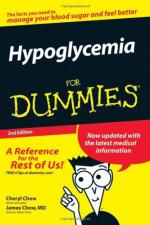|
This section contains 1,485 words (approx. 5 pages at 300 words per page) |

|
Definition
Hypoglycemia (pronounced HI-po-gli-seem-ee-ah) means low blood sugar. The main fuel used by cells to produce energy is a type of sugar called glucose. Glucose is carried to cells in the bloodstream. In that form, glucose is often referred to as "blood sugar." Cells need a minimum amount of glucose to function properly. When there is not enough glucose in the blood to meet those needs, the condition known as hypoglycemia develops.
Description
An important part of the human diet is carbohydrates—sugars and starches. Carbohydrates are changed in the digestive system to glucose. The bloodstream carries glucose to cells. Cells use glucose to produce the energy needed for walking, talking, and just staying alive.
In some cases, people do not get enough glucose in their regular diet. Or they get enough glucose, but their body does not use it properly. In such cases, the person develops hypoglycemia...
|
This section contains 1,485 words (approx. 5 pages at 300 words per page) |

|


